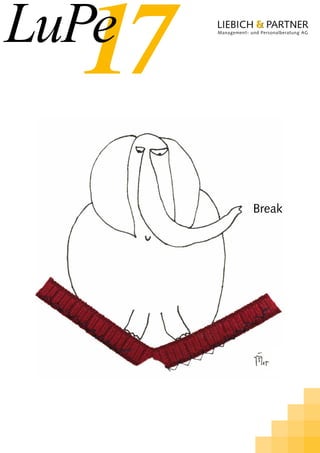Break! Ni hao!
•
0 likes•93 views
Lupe Edition No. 17, Liebich & Partner Magazine for Clients, Article about cross-cultural understanding
Report
Share
Report
Share
Download to read offline

Recommended
Recommended
More Related Content
Similar to Break! Ni hao!
Similar to Break! Ni hao! (20)
Diplomacy and Boundary Navigation ASAP Presentation

Diplomacy and Boundary Navigation ASAP Presentation
Leadership Style Assessment ResultsYour assessment results sho.docx

Leadership Style Assessment ResultsYour assessment results sho.docx
MGM316-1401B-01Quesadra D. GoodrumClass Discussion Phase2.docx

MGM316-1401B-01Quesadra D. GoodrumClass Discussion Phase2.docx
Untangle The Mystery Of Other People's Behaviour Using The DISC Personality Test

Untangle The Mystery Of Other People's Behaviour Using The DISC Personality Test
Managing Tough personalities @ work in increasingly competitive world experie...

Managing Tough personalities @ work in increasingly competitive world experie...
Paper Presentation on Problems Related to Global Business due to Cultural Div...

Paper Presentation on Problems Related to Global Business due to Cultural Div...
Organizational behavior in different cultures report

Organizational behavior in different cultures report
Recently uploaded
Recently uploaded (11)
Group work -meaning and definitions- Characteristics and Importance

Group work -meaning and definitions- Characteristics and Importance
W.H.Bender Quote 63 You Must Plan T.O.P Take-Out Packaging

W.H.Bender Quote 63 You Must Plan T.O.P Take-Out Packaging
TEST BANK for Operations Management, 14th Edition by William J. Stevenson,.pdf

TEST BANK for Operations Management, 14th Edition by William J. Stevenson,.pdf
Leading People - Harvard Manage Mentor Certificate

Leading People - Harvard Manage Mentor Certificate
LECTURE maintenance management is important 1.pptx

LECTURE maintenance management is important 1.pptx
Spring-2024-Priesthoods of Augustus Yale Historical Review

Spring-2024-Priesthoods of Augustus Yale Historical Review
DrupalCamp Atlanta 2022 - Effective Project Management

DrupalCamp Atlanta 2022 - Effective Project Management
Management 13th Edition by Richard L. Daft test bank.docx

Management 13th Edition by Richard L. Daft test bank.docx
Marketing Management 16 Global Edition by Philip Kotler test bank.docx

Marketing Management 16 Global Edition by Philip Kotler test bank.docx
Break! Ni hao!
- 2. the decision-makers are. If you approach the wrong person you won’t be told, out of polite consideration, and will wonder why the friendly discussions are often inconclusive. There is a similarly significant deviation in the dimension of individualism. Here we are defined in terms of one’s personality, in Asia it’s in terms of group memberships. Employees, sales partners and customers in collectivist cultures are perfect networkers, very peace-loving and shy away from conflict situations in order to „save face“. It is necessary to establish real, familiar relationships. But the loyalty gained from these is to the person, and not to the company for which that person stands. If that person should leave the company, there is a big risk that the workforce and business partners will turn their backs on the organization. Masculinity and uncertainty avoidance are model dimensions in which Asian cultures are different. While in Japan masculine values such as strength, power and competition dominate, in Thailand or Vietnam it is feminine balance, Andreas Kambach worked for 13 years in Asia, six of those were in Singapore. He experienced the Asian cultures with all their nuances and differences, and embraced them, so much that the behaviour of Germans there appeared alien to him. liebich-partner.de/andreas-kambach Companies that rely solely on their German cultural understanding are putting a lot at stake when breaking into Asian markets. Moral concepts and behaviour patterns sometimes deviate significantly from what the customs here. Studies conducted by social psychologist Prof. Dr. Geert Hofstede have shown that there is more to it than just a feeling of otherness. Hofstede compared national cultures and identified dimensions that are relevant for business (geert-hofstede.com). When comparing Germany with Asia the levels of power distance are noticeably different. In Germany a manager needs to have the relevant competencies to be recognized in his leadership role, whereas in Asian countries the employees aren’t that bothered about what a manager can do: the boss is the boss because he’s boss. He decides and says what everyone has to do. Involving the employees in decision-making leads frequently to disorientation. Leadership should be task-oriented, and not target- oriented. This dimension is also relevant when dealing with market partners. Decisions are made at the highest level. The problem is it’s not always clear who »The boss is the boss because he’s boss.« »There’s more to it than a feeling of otherness.« Breaks in cultures Ni hao! As companies expand beyond national borders, they too often forget that they are not only venturing into new markets, but also into distant cultures. Being successful means associating with foreignness. A personal report from Asia. humbleness and cooperativeness which drive the society. Typical of the Japanese culture is also high uncertainty avoidance, which plays more of a minor role in China or Singapore. The idea of hiring local general managers to run the subsidiaries abroad doesn’t prevent cultural misunderstandings from occurring. Most Asians have a keen sense of what pleases the „distant parent“ even if the does not represent the reality. Managing breaks in cultures requires cross-cultural skills. Not just one, but numerous employees have to live in, and with, the culture; interacting with others in an unbiased way, without imposing German views and working principles on their Asian counterparts. It is only when companies associate with the foreignness that they can recognise the potential in it, and be successful in distant cultures.
